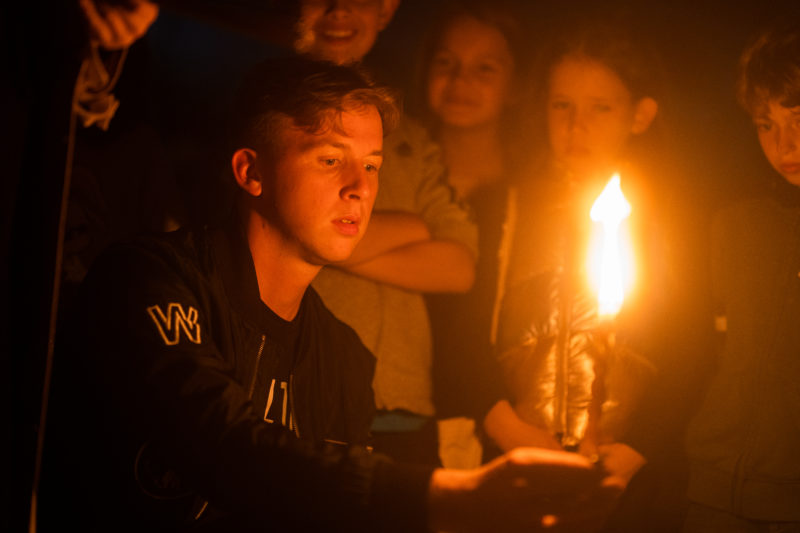Opinion
Continuing journey
For Jewish Europe, the future is now
In Short
Jewish leaders and professionals, often mired in internal concerns and challenges, were forced by the pandemic to look outward. Their community programs began to fill with people searching for meaning and help and turned to the Jewish community, many for the first time.
We live at a time of diminishing nuance, viewing issues through narrow narratives and framing. For the Jewish community, faced with increasing antisemitism and concerns for the future, such a dynamic leads to statements like “Jewish life in Europe is over.”
Such a soundbite misses the people and communities working to make Jewish life thrive. They ignore a Jewish Europe that is vibrant and populated by communities grappling with serious challenges by responding with strength and creativity.


JDC
Rabbi Abraham Joshua Heschel said “you must build your life as if it were a work of art.” The Jewish communities of Europe are indeed the avant-garde, producing dynamic canvases that are appealing and evolving.
The new JDC-ICCD [International Centre for Community Development] Fifth Survey of European Jewish Community Leaders and Professionals speaks to this fact. In its pages we find community leaders and professionals who are fully engaged, eschewing emigration and committed to local communities. They feel this way even though for the first time in the survey history, they rank antisemitism and combating it first among their concerns and priorities.
Just below the surface of this pressing challenge is another: The desire of these leaders to expand their definition of community and membership. They want to do so by engaging young people, the unaffiliated and volunteers.
My work in Jewish community development over the last two decades gives me great pause and much pride in these findings. They reflect a consensus voice for introspection and the rethinking of models of engagement. For those grassroots social innovators and young adults just entering the gates of the Jewish community or those who decidedly remain outside those gates, this should be a clarion call.
But how do we ensure success in these endeavors and guarantee this isn’t just another page in the history of Jewish opportunities unfulfilled?
First we must listen. As Lord Rabbi Jonathan Sacks, z”l, said, “If you would only listen … Judaism is a religion of listening. This is one of its most original contributions to civilization.” This survey, and the voices of many Jews who entered the Jewish community through online venues during the pandemic, demonstrate a rare moment when the confluence of interests are mutually beneficial.
Jewish leaders and professionals, often mired in internal concerns and challenges, were forced by the pandemic to look outward. Their community programs began to fill with people searching for meaning and help and turned to the Jewish community, many for the first time. In our spaces they found what they were looking for—in the holiday programs, JCC activities, and social service assistance. The Jewish community was an anchor of stability and support in an unprecedented storm.
Second, we must lean into this positive disruption and incorporation of new models. Europe’s Jewish leaders are primed to expand on what seemed like temporary pandemic adaptations and build them for the future. After all, they brought in new cohorts of people to community life, but we need to keep them on the path. The next step, these leaders note in the survey, is to develop outreach strategies, volunteer opportunities and leadership development initiatives to engage people in the work of the community.
But it’s not enough to simply support and engage. We have to provide space for these passionate people to actively participate and lead. Otherwise, we risk disengagement and disillusion. I was recently in Budapest and met with young social entrepreneurs at JDC’s Moziak Hub, which incubates programs and initiatives representing the next generation of Jewish life in Hungary. These people are focused not simply on building Jewish identity, aiding needy Jews or tikkun olam platforms. They’re shaping the Jewish future and receiving the mentorship, training in best practIces and seed funding needed to achieve that goal.
Third, we need to embrace readiness as a way of doing business. The survey notes that “many communities and institutions established emergency management teams because of the COVID-19 crisis.” And yet 48% or respondents said that they did not have such a body or didn’t know if it existed in their community. What we have learned from the pandemic – and from antisemitism, acts of terror and other efforts undermining Jewish identity – is that crisis is an inevitable feature of Jewish life, in Europe and worldwide, threatening to weaken us.
And yet, if we strengthen communities’ ability to utilize their resources and adapt to changes in the environment before a crisis – indeed improving their resilience in the face of possible challenges – they will come out stronger on the other side. By continuing to function during challenging times, and providing life-saving support preserving and promoting their members’ physical and psychological wellbeing, they become a central address during crises. But resilience work must go beyond critically important security and trauma support. It must build sustainability into all areas of community life, from social welfare and wellbeing structures to financial models and transition/succession planning. Preparing communities for the future starts now.
It’s easy to play the doom card and pack it in. But the last two years has taught that the Jewish knack for perseverance won’t be given up, especially in a place like Europe where Jewish civilization continues to unfold in new and exciting ways. Our choice is simple: be part of that continuing journey and start by writing the full story, not just the headlines.
Alejandro Okret, JDC’s executive director of international programs, oversees the organization’s work in Europe.











